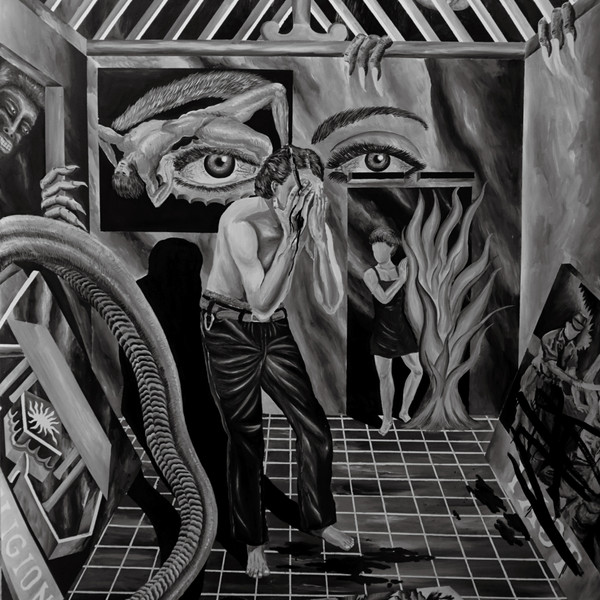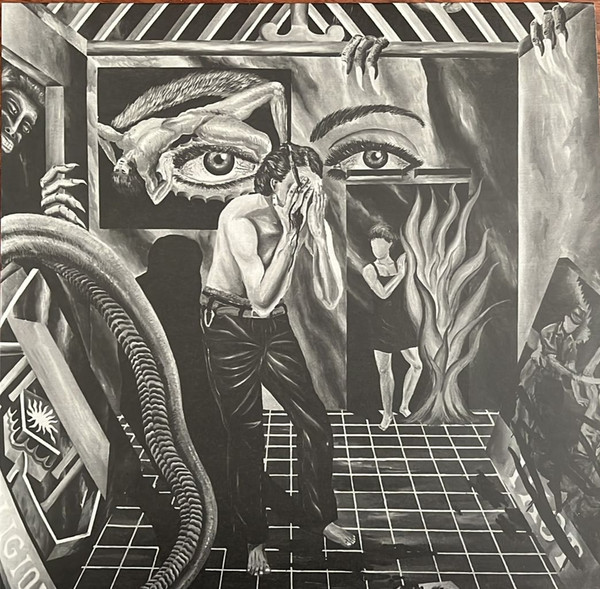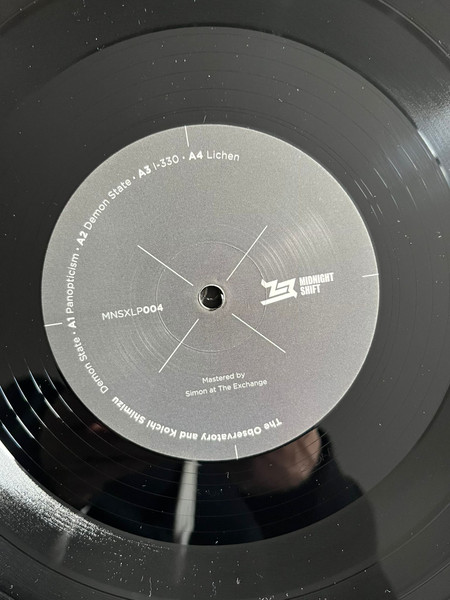ALL RIGHTS RESERVED © CG
Closed today
1 / 0
The Observatory Koichi Shimizu
Demon State




Artists
Labels
Catno
MNSXLP004
Formats
1x Vinyl LP Album Limited Edition
Country
Release date
Sep 23, 2022
“There was something extra-political, extra-social, almost extra-human about it; it smacked of tidal waves, of natural forces . . . These emotions are my instruments.”
— Richard Wright, The Color Curtain: A Report on the Bandung Conference (1956)
The Observatory is one of those last few bands that can change and become your life. Stuck in Singapore, the wilful outlier of Southeast Asia, this ever-shifting group stubbornly evolves past the 2018 departure of its cofounders—singer-songwriter/guitarist Leslie Low and Vivian Wang, fellow singer and keyboardist—both of whom started The Observatory in 2001 as a space, an idea, a collective of independence. Since then, the current trio has ventured into more improvisational, instrumental, and noise-adjacent territories in an EP with collaborator Haino Keiji.
In DEMON STATE, long-time member Dharma and Cheryl Ong plus Yuen Chee Wai continue The Observatory’s bold partnerships, this time with electronic musician Koichi Shimizu (IMPRINT). Together, they finally reach this long-gestating, total (yet I’m sure temporary), and rhythm-focused, electronic reinvention of The Obs—while briefly nodding to their past. The road is long; DEMON STATE is one pit stop in glorious hell.
Partly stemming from a casual, improv studio session in early 2020 that Koichi recorded (for an as-yet-unmade album), the eight tracks on DEMON STATE—their first release on the Midnight Shift label—were formed from a gradual accumulation of sonic layers; they were foraged, recycled, and pieced together remotely also from solo bedroom recordings, a historical sample, nonhuman beats and effects, as well as journals and junk.
After you-know-what vexed the earth, Koichi, who The Obs has worked with in various capacities since the mid-2000s, when he was based long term in Bangkok, rearranged the original recordings and built upon the session’s organic rhythms with synthesised sounds— from the safe distance of Japan, where “his new life hasn’t fully started yet”. Meanwhile, in their $ingapore studio, Black Axis, The Obs recorded new samples and songs for a mixed- reality art exhibition, DEMON STATES (note the plural), which staged early versions of various DEMON STATE songs in immersive and cyberpunk environments of the virtual and physical. This experience at the Singapore International Festival of Arts 2021 served as DEMON STATE’s road test, a one-stop, durational tour of their fifteenth release’s deep dive underground into the myriads of evil and the origins of totalitarianism: global states of dystopia; the wretched of the earth; late, hyperpop Southeast Asian (SEA) capitalism; the neocolonialism of the local Bicentennial; and Satan(s), for instance, as well as possible resistance against them, despite continuing confinement, separation, and a dearth of spiritual imagination. The accompanying roots of these visually blended worlds extend over to this psychically filmic LP—even as the band is now staging a major art exhibition, REFUSE, about fungi.
Despite these multiple sporulations and alternate realities, the Gesamtkunstwerk-like DEMON STATE is a standalone work: of human menace and potential, and the restorative quietude of nature like mushrooms. The central pair of tracks—also the only two with discernible vocals—“Demon State” and “Imprisoned Mind” pulsate with rage and radical possibilities. Drawn from the subconscious, almost-automatic writing of multi- instrumentalist Chee Wai—who also voices his journal extracts in an uncanny tone, unintentionally akin to The Obs’s dark-wave masterpiece CATACOMBS (2012)—the “lyrics” of the title track morph “Demon State” from a noun to a verb (“Demonstrate”, the unspoken “Deracinate”) to adjective (describing the “various geographical demon states” we live in, as well as our souls and sanity, or lack thereof); from the singular to the plural and collective, even rhyming it with “Eviscerate” in its fiery conclusion. The “waste” referred to in this ritualistic chant is upcycled into Koichi’s “(Demonstrate Remix)”. Hearkening back to The Obs’s remix album BEHIND THESE EYES (2014), which imaginatively fucked up CATACOMBS, this existentially trying remix expands upon the “lies overflowing like secrets” with an alternate, demonic background chorus.
On “Imprisoned Mind”, The Obs are joined by Sukarno/Soekarno (1901–1970), Indonesia’s first president (from 1945 to 1967), and marching industrial kicks. Regarded as the leader of the Indonesian independence movement—which sparked off similar struggles in Southeast Asia—the imprisoned and exiled revolutionary was renowned for his oratory. It is Sukarno’s burning-through-the-scratchiness speech recording from the underacknowledged Asian- African Conference, AKA Bandung Conference, that is sampled here. In West Java’s capital in 1955, the “Third World” of Afro-Asian political leaders (“so-called coloured people”, representing more than half the world’s population) discussed how to fully wrest control back from the French, Dutch, even the Soviets. “Colonialism in all of its manifestations”— especially the insidious, modern form—was valiantly fought back against, then the fight was forgotten. Featuring the sound waves from this brief solidarity of the oppressed, “Imprisoned Mind” encapsulates a resurrection of radical energies.
Fittingly, the gamelan/gamelang/gamelin—Indonesian, ensemble-type, bronze gong sets struck with mallets—makes a return here, but counterintuitively. The orchestral instruments that inspired a whole generation of sound artists are reclaimed in “Panopticism” (originally titled “Evil Eye”) and seemingly mimicked in “Lichen”; on this enmeshed album, it is impossible to differentiate instrumentation, let alone who played what. The reyong, gong, and (sampled) jegogan, composed on The Obs’s own six-tone scale (like on their 2015 album CONTINUUM), is additionally layered with mechanised beats and dual prepared guitar by Chee Wai and Dharma, who clip their electric guitar strings with “stuff or junk accumulated over the last seven years”, such as spoons and screws, clips and metal picks. While CONTINUUM’s gamelan was mostly spiritual, almost ambient, and melody-based, the gamelan noise here restlessly skews towards furious rhythms. On the standout “Lichen”, for instance, an effected snare sounding like the gamelan vibrates with distortion, slow-then- fast tension, and insomniac hollowness of the mind. Hearing it (ideally sober, like with the rest of the album, it is intense enough) is akin to seeing things falling down in quick and uncontrollable succession: the tropical monsoon rain, hooked mallets, a masseur’s knuckles, preprogrammed motives, the scales from our eyes.
Amidst all this regal vigour, a slight reprieve of softer variation is weaved throughout. On the A side, “I–330” twitches and glitches amidst the bass crashes—the titular character from Yevgeny Zamyatin’s novel samizdat We (1924) would be disturbed. Meanwhile, “Animal” explores the higher end of the frequency spectrum to shimmering and tinnitus-bequeathing effect; “Psyberia” transports us to somewhere like Aldous Huxley’s Island [1962; a companion to Brave New World (1932)], where the subjects of this kingdom consume an indigenous concoction of psilocybin mushrooms to attain a trance-like peace and awareness. Sequenced as the penultimate track, before the closing return of “Demon State” in rehaunted form, this number glides with such grace and slightly psychedelic colours, grooving with the ostensible silence—finally—into similar states of potential being.
A vinyl and digital release, DEMON STATE features the cover-art illustration of Enka Komariah (Senyawa, Raja Kirik). As The Obs describe it, the “sense of wretchedness in this, the waste of capitalism, the evils of racial discrimination, the ever-spiralling mess, the awakenism of control” are confronted, head on in the band’s pattern, to disturb, comfort, confuse, worship, dance, rest, and resist. Ultimately, and returning from the collective, the singular form of DEMON STATE refers to our personal, individual, and ineffable states of demonic possession. DEMON STATE embraces us in the independent space of The Obs, where we can be alone together. It offers its listener some type of solace, if not an exorcism. For when the devil has been in us for this long, who’s to say who’s possessing who, who’s whispering sibilant sounds in our ears, who’s wearing the mask, who’s not yet dead and who’s still alive? Who’s still fighting for a just world?
$45*
*Taxes included, shipping price excluded
A1
Panopticism
A2
Demon State
A3
I-330
A4
Lichen
B1
Animal
B2
Imprisoned Mind
B3
Psyberia
B4
Demon State (Demonstrate Remix)